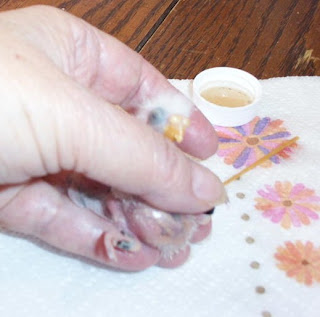This post is mostly about disappointments, however, keep in mind that we did just band baby Bourke #25…so there is also much good news for 2010.
Currently, Brandy is on three eggs with Rory. He never produced fertile eggs with Bella and we hope he does better with Brandy. She is the hen who had a baby savaged and others injured. I had to rescue all her babies with Chitter and hand feed them. Now, Chitter is with Bella (Rory’s former mate). Chitter and Bella are successfully raising one baby, the only fertile egg that Bella has ever laid. This baby is still in the nest, but fully feathered and has never had any injury. So, Chitter and Bella may prove to be a happy, successful pair with Chitter exonerated.
If Rory is also unable to fertilize Brandy’s eggs, then perhaps she is the best hen for him to have, since it is beginning to look like she is the guilty party who injured her young. Brandy is currently on two eggs with more expected. She came from one of our best breeding pairs. They were wonderful parents. One of Brandy’s hand fed daughters is my favorite bird…very affectionate, very intelligent and so sweet. Genetics isn’t reliable at predicting what a bird’s (or a person’s) personality is going to be like.
Sugar is back on three eggs. She and Spice have had two previous clutches that were fertile, but did not hatch. She seems devoted to incubating her eggs, so I don’t believe the problem is that they got cold. Must be something else. Spice is a hand fed Normal Bourke. Rosie, my favorite hand fed Bourke hen, is very interested in him. If none of Sugar’s eggs hatch this time around, I may replace Sugar with Rosie. Sugar isn’t tame, and for that matter, isn’t as pretty as Rosie. I could put Sugar with Spicy’s father, Bing Jr., as his hen, Willow, is older than Bing Jr. and she’s no longer interested in brooding.
Decisions, decisions, decisions.
SPLENDIDS:
If you’ve been following this blog, you know that our two pairs of Splendids haven’t produced any youngsters for the past two years.
 And so, this year I swapped Splendid mates. Although Rainbow and Rivka were observed attempting to mate, her eggs were not fertile with him either. It’s so disappointing! The other new pair took longer to become friendly with each other. The hen, Jewel, has entered the nest box and Rainbow Jr. has been feeding her. However, no attempts at mating have been observed. It seems unlikely that she will hatch her eggs either.
And so, this year I swapped Splendid mates. Although Rainbow and Rivka were observed attempting to mate, her eggs were not fertile with him either. It’s so disappointing! The other new pair took longer to become friendly with each other. The hen, Jewel, has entered the nest box and Rainbow Jr. has been feeding her. However, no attempts at mating have been observed. It seems unlikely that she will hatch her eggs either. There is one other recourse available, short of finding new Splendids, which I haven’t been able to do. We have two extra Splendid males. Unfortunately, Flip is unable to fly due to a “window accident” as a very young bird … hence his name … after his accident, when he tried to fly with his injured wing, he’d flip over. The other male, Rudy, is one I traded for. He came from the same breeder who provided the hens and the breeder can’t tell me whether the three birds are, or are not, related to each other. I had hoped to acquire another hen for Rudy, but it has never happened. I’m considering putting him with one of these hens and see what happens. They just might accomplish something.
Looking ahead to future posts:
• Budgies make great kids’ pets. How to be sure the Budgerigar parakeet you buy is a young one.
• Photos of intricately carved egg shells.









